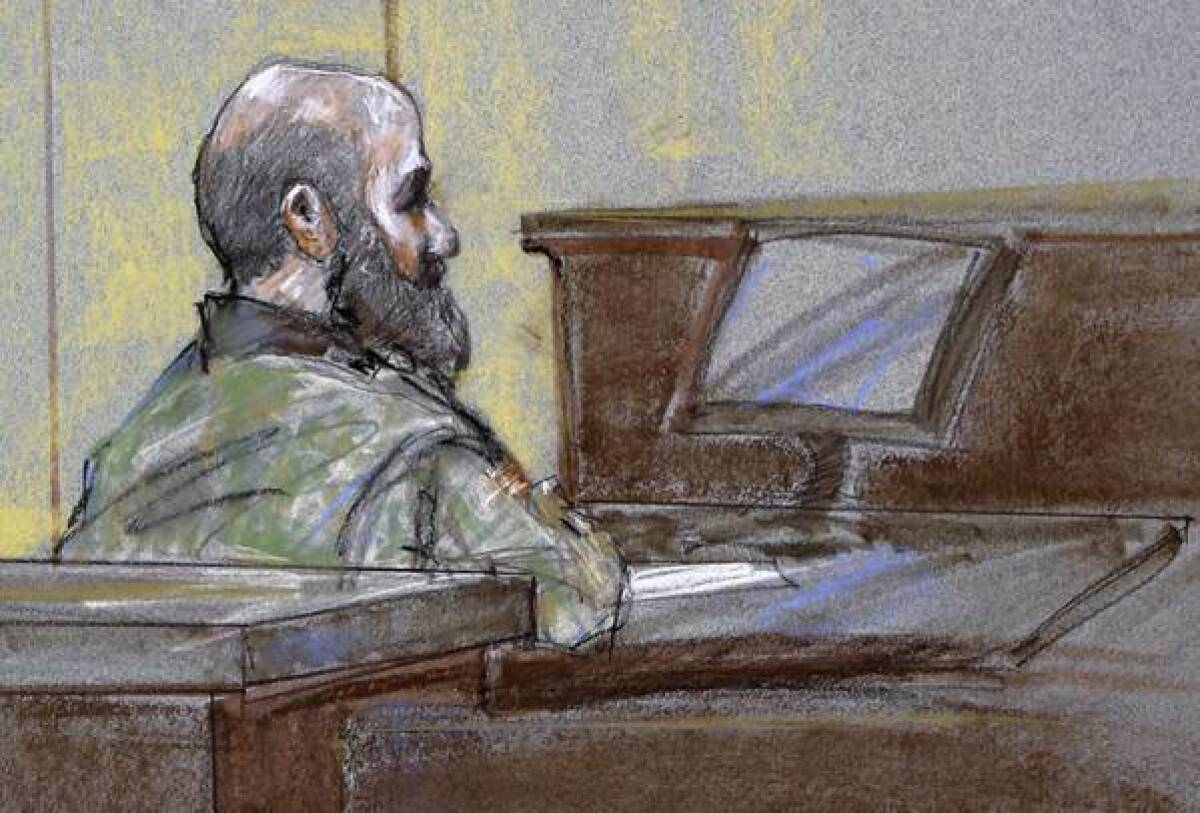Ft. Hood shooter received glowing evaluations before attack

Months before the Ft. Hood shooting in November 2009, the Army psychiatrist convicted Friday of killing 13 and wounding more than 30 was completing a fellowship at Walter Reed National Military Medical Center, where military supervisors praised his unique interest in Islam’s impact on soldiers, according to documents provided to The Times.
Maj. Nidal Malik Hasan’s supervisors had also repeatedly recommended him for promotion, according to documents.
“He has a keen interest in Islamic culture and faith and has shown capacity to contribute to our psychological understanding of Islamic nationalism and how it may relate to events of national security and Army interest in the Middle East and Asia,” supervisors wrote in an evaluation report July 1, 2009.
Among Hasan’s “unique skills,” the report listed “Islamic studies” and “traumatic stress spectrum psychiatric disorders,” concluding that “Maj. Hasan has great potential as an Army officer.”
The officer evaluation report, and another from earlier that year, were provided to The Times by Hasan’s civil lawyer, John Galligan, who says he believes they are relevant to Hasan’s sentencing, which is set to begin Monday. He is eligible for the death penalty.
Hasan, 42, has been convicted of 13 charges of premeditated murder in the Nov. 5, 2009, shooting in Texas. The same jury of 13 officers that convicted him will determine his sentence. For a death sentence to be imposed, the decision must be unanimous.
Galligan, a former military judge, said the reports could be used at Hasan’s sentencing to argue against a death sentence. But Hasan, who will be representing himself at sentencing as he did at trial, has yet to submit them as mitigating evidence. Galligan says he is concerned the jury will have an incomplete account of Hasan’s service record and the role superiors played in promoting him.
The evaluation reports were filed while Hasan, an American-born Muslim, was earning a master’s degree in public health through a two-year fellowship in disaster and preventive psychiatry. A colleague of Hasan’s at Walter Reed testified that he pursued the fellowship in order to avoid deployment.
The other report, completed March 13, 2009, said Hasan had “outstanding moral integrity” and that he had selected a “challenging topic” for his master’s of public health project: “the impact of beliefs and culture on views regarding military service during the Global War on Terror.”
Supervisors recommended Hasan for a position “that allows others to learn from his perspectives,” noting his “unique insights into the dimensions of Islam” including “moral reasoning” were “of great potential interest and strategic importance to the U.S. Army.”
An Army doctor testified that a month before the attack, Hasan told her that if the military forced him to deploy to the Middle East “they will pay.” He was later ordered to deploy to Afghanistan, and began plotting his attack.
Prosecutors argued during his trial that Hasan was motivated by a “jihad duty” to kill soldiers. Hasan rarely challenged them, admitted to the shooting in his opening statement and argued that his religious beliefs led him to switch sides and attack fellow soldiers. He declined to cross-examine prosecution witnesses, call his own witnesses, testify or submit much evidence — in contrast to the prosecution, which called nearly 90 witnesses and submitted more than 700 pieces of evidence.
ALSO:
Marchers return to Washington to years later
Bales gets life in prison without parole for Afghan killings
Georgia school-shooting hero meets 911 dispatcher: ‘We made it!
Follow L.A. Times National on Twitter
More to Read
Sign up for Essential California
The most important California stories and recommendations in your inbox every morning.
You may occasionally receive promotional content from the Los Angeles Times.











